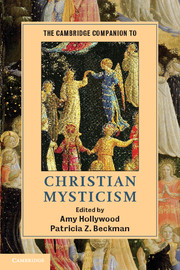Book contents
- Frontmatter
- Contents
- Contributors
- Introduction
- Part I Contexts
- Part II Key Terms
- 5 Apophatic and Cataphatic Theology
- 6 Lectio Divina
- 7 Meditatio/Meditation
- 8 Oratio/Prayer
- 9 Visio/Vision
- 10 Raptus/Rapture
- 11 Unio Mystica/Mystical Union
- 12 Actio et Contemplatio/Action and Contemplation
- Part III Contemporary Questions
- Select Bibliography of Christian Mystical Texts up to around 1750
- Select Bibliography of Modern Works Related to the Study of Western Christian Mysticism
- Author and Artist Index
- General Index
- References
7 - Meditatio/Meditation
from Part II - Key Terms
Published online by Cambridge University Press: 05 December 2012
- Frontmatter
- Contents
- Contributors
- Introduction
- Part I Contexts
- Part II Key Terms
- 5 Apophatic and Cataphatic Theology
- 6 Lectio Divina
- 7 Meditatio/Meditation
- 8 Oratio/Prayer
- 9 Visio/Vision
- 10 Raptus/Rapture
- 11 Unio Mystica/Mystical Union
- 12 Actio et Contemplatio/Action and Contemplation
- Part III Contemporary Questions
- Select Bibliography of Christian Mystical Texts up to around 1750
- Select Bibliography of Modern Works Related to the Study of Western Christian Mysticism
- Author and Artist Index
- General Index
- References
Summary
In the Christian tradition, meditatio (meditation) has long been considered an essential element of the contemplative life. Meditation is almost always seen as training or preparation for the higher activity of prayer or contemplation, an intermediate stage rather than an end in itself. In considering meditation, it is useful to distinguish between meditation as a practice or spiritual exercise and meditation as a written form. The latter includes narratives that often are or claim to be the product of the writer’s personal experience and serve the didactic function of providing models to imitate or inspiration for those seeking to practice meditation in pursuit of the contemplative life. It would be mistaken, however, to consider meditatio as a well-defined literary genre or formal category in the Middle Ages. The term is loosely applied to a range of works in both prose and verse and is often not used in connection with works for which it would seem appropriate, at least according to the modern understanding of the term. The element of private self-examination seems to be a common denominator, but there is considerable variation.
In the early Middle Ages, meditation as an activity is almost exclusively associated with monasticism, and later developments reflect these monastic origins. The monastic rules of the early Middle Ages mention meditatio as a spiritual exercise most frequently in connection with the reading of a text, as Jean LeClercq explains, and it is clear that the term means something other than its modern sense of private thought or solitary reflection. In early monasticism, meditari, the Latin verb related to meditatio, usually means the private recitation of a text, with a view toward memorizing it. The text most likely to be meditated upon in this fashion was a biblical text, often the Psalms, which were central to the liturgical life of the monastery. It is important to note that meditation in this sense is never free-form speculation or associational thinking but is always tied specifically to a text.
- Type
- Chapter
- Information
- The Cambridge Companion to Christian Mysticism , pp. 157 - 166Publisher: Cambridge University PressPrint publication year: 2012
References
- 3
- Cited by



